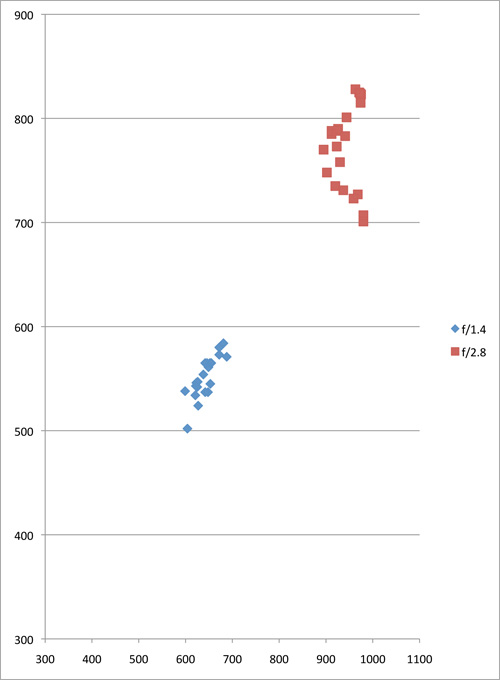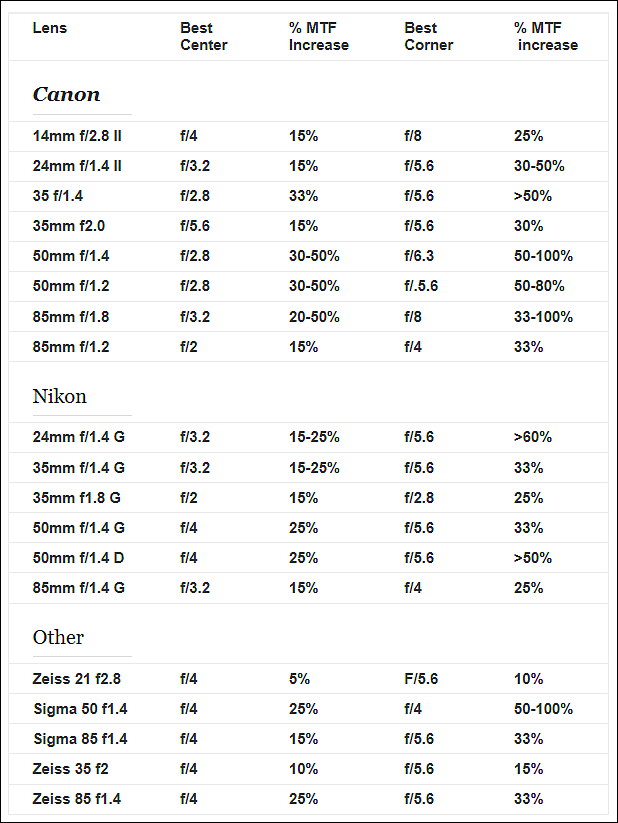
Please, support PV!
It allows to keep PV going, with more focus towards AI, but keeping be one of the few truly independent places.
It allows to keep PV going, with more focus towards AI, but keeping be one of the few truly independent places.
Sharpness and aperture
-
The truth is wide-aperture primes are usually not exceptionally sharp wide open. They appear to be sharper than they really are because the in-focus subject stands out so much from everything else (assuming the subject is near the center) given the narrow depth of field wide open. But if you measure the absolute resolution numerically, a prime lens shot at f/1.4 is no sharper (and in many cases less sharp) than a top quality zoom shot at f/2.8.
Let’s look at a very good wide-aperture prime, the Canon 35mm f/1.4 “L” lens. Here are the Imatest results for fifteen Canon 35mn f1/.4 lenses measured at both f/1.4 and f/2.8 apertures. (The number on the vertical axis is the MTF 50 weighted average for the entire lens, that on the horizontal axis is MTF50 at the center point).
More lenses compared:
Small conclusion:
1.Some lenses benefit greatly from being stopped down, others very little.
2.For those lenses that do benefit, stopping down just to f/2.0 provides the majority of resolution improvement. The difference between wide open and f/2.0 is generally much greater than the difference between f/2.0 and the maximum resolution.
3. Getting the edges and corners sharp requires stopping down to at least f/4 for most wide-aperture primes, and some really need f/5.6. Stopping down to f/2.8 may maximize center sharpness but often makes only a slight difference in the corners, at least on a full-frame camera.
4. None of the lenses performed any better after f/5.6 (for the center) or f/8 for the corners. Most were clearly getting softer at f/11.
Read full article at: http://www.lensrentals.com/blog/2011/11/stop-it-down-just-a-bit

 aperture.png618 x 823 - 87K
aperture.png618 x 823 - 87K -
Most lenses shoot sharper stopped down a little. I tend to consider the maximum usable aperture when buying a new lens. Still, when using a FF or SLR legacy lens on a GH2 for video, having a little less sharpness is often not a negative. One of the things I like about the FD lenses is how they compensate for the slightly over-sharp look of GH2 video (especially with the Panasonic lenses).
-
2.0/2.8/4.0 seem sweetspots for GH2 where 2.8 is a good balance for overall sharpness and CA control.
Samyang 35mm 1.4 has good sharpness at 1.4 on GH2, but it has a heavy breathing. I wonder if that's a common trait of big lenses at affordable price. Native m43 lenses have shown the least amount of breathing.
Unless one goes after more beautiful bokeh, lenses optimized for 2.8 might be a better bet. Such lenses with max aperture 2.0 would be very nice. e.g. Olympus 12mm 2.0. But those are expensive.
If CMOS sensor & in-camera processing continue to improve low lighting performance, 2.8 might not be too slow. Also the fastest aperture with image stabilization is 2.8. OIS really improves sharpness.
Some people hate too much sharpness. I speculate a cheap low quality filter might fix the issue :) -
@stonebat
I think you have to aim for a lens a stop or two faster than what you plan to shoot at in most cases. Some F2.8 lenses are sharp wide open (Leicas tend to be in my limited experience) but generally, lenses aren't at their best at their largest aperture, so a lot of F2.8 lenses don't shine until f4. So that's a reason to get F1.4 or F2 lenses--so you can shoot comfortably at F2.8. -
I got your point. That's what I sorta meant "optimized for 2.8" :)
I guess focal length plays some role, too. I want good optical performance at the specified aperture respectively on GH2:
12mm 2.8
25mm 2.0
50mm 1.4
The shorter the focal length, the deeper DOF.
50mm at 1.4 might suffer from CA, but bokeh will take care of it.
PL 25mm 1.4 and Nokton 25mm 0.95 are winners for good optical performance at 2.0.
12mm at 2.0 or faster lens giving good optical performance at 2.8 would be great. Is the HyperPrime 12mm 1.6 such lens?
Gawd I wish Samyang makes 12mm 2.0 for m43. I wanted to say that for all day. Samyang made 35mm 1.4. They will release 24mm 1.4. They released 8mm 3.5 for m43. I really hope they release 12mm 2.0 that competes with Olympus lens. Of course mechanical focus ring. Seriously if SLR Magic can make, Samyang can. :)
Start New Topic


Howdy, Stranger!
It looks like you're new here. If you want to get involved, click one of these buttons!
Categories
- Topics List23,970
- Blog5,724
- General and News1,346
- Hacks and Patches1,153
- ↳ Top Settings33
- ↳ Beginners255
- ↳ Archives402
- ↳ Hacks News and Development56
- Cameras2,360
- ↳ Panasonic990
- ↳ Canon118
- ↳ Sony155
- ↳ Nikon96
- ↳ Pentax and Samsung70
- ↳ Olympus and Fujifilm100
- ↳ Compacts and Camcorders300
- ↳ Smartphones for video97
- ↳ Pro Video Cameras191
- ↳ BlackMagic and other raw cameras117
- Skill1,961
- ↳ Business and distribution66
- ↳ Preparation, scripts and legal38
- ↳ Art149
- ↳ Import, Convert, Exporting291
- ↳ Editors191
- ↳ Effects and stunts115
- ↳ Color grading197
- ↳ Sound and Music280
- ↳ Lighting96
- ↳ Software and storage tips267
- Gear5,414
- ↳ Filters, Adapters, Matte boxes344
- ↳ Lenses1,579
- ↳ Follow focus and gears93
- ↳ Sound498
- ↳ Lighting gear314
- ↳ Camera movement230
- ↳ Gimbals and copters302
- ↳ Rigs and related stuff272
- ↳ Power solutions83
- ↳ Monitors and viewfinders339
- ↳ Tripods and fluid heads139
- ↳ Storage286
- ↳ Computers and studio gear560
- ↳ VR and 3D248
- Showcase1,859
- Marketplace2,834
- Offtopic1,319






